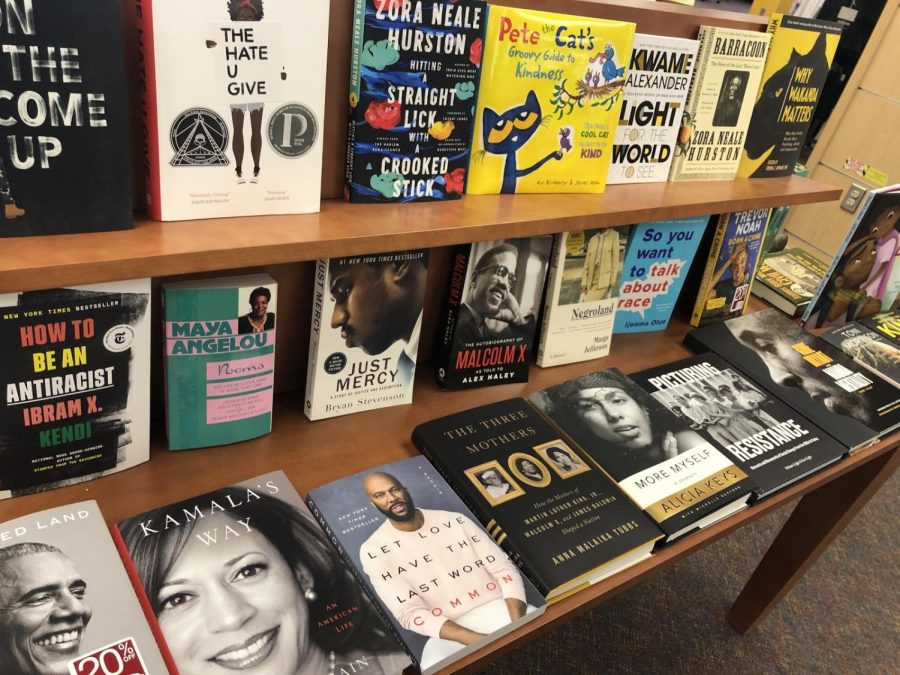Black history, antiracism booklist to continue a year of educated reading
Black History Month often drives sellers to create sections promoting Black stories. Kent State University’s bookstore is no different.
Now that Black History Month has come to a close, you may be questioning: “How can I celebrate Black voices all year round?” or, “What can I do to continue my education of Black stories (and histories) beyond this month?” One avenue avid informationists might take to keep the momentum of personal education flowing is reading. To help formulate your own catalog of illumination, here’s a glimpse into an anti-racist, white-allyship and Black history learning lineup for the coming months.
To start off the list, let’s contemplate one of the most popular picks of the past year: “How To Be An Antiracist” by Ibram X. Kendi. Since the awakening of demand for race and culture education after the events of last summer, Kendi’s work has been noteworthy in the media and recognizably soaring off of bookshelves. His work is consistently out of stock on Amazon. Other authors of race education like Robin DiAngelo and Ijeoma Oluo have praised this book as “revolutionary” and one that incites “action, not emotion.” If you haven’t read this one yet, you may want to hurry up and grab a copy!
Another prominent author recognized in the past year for their 2018 book titled “So You Want to Talk About Race” is Ijeoma Oluo. She is a Nigerian-American writer from Denton, Texas, and has written for The Guardian, Jezebel, The Stranger, Medium and The Establishment where she was also an editor. She said in the book on privilege, “When we identify where our privilege intersects with somebody else’s oppression, we’ll find our opportunities to make real change.”
One book appearing on many dockets for the masses questioning implicit biases and white privilege was “White Fragility: Why It’s So Hard for White People to Talk About Racism” by Robin DiAngelo. Published in 2018, DiAngelo’s book covers her experiences as an academic and race-relations expert. She coined the term “white fragility” to describe the sometimes gut reaction of people who identify as white when faced with questioning their relation to racial injustice and other similarly charged topics. She said in her book, “The simplistic idea that racism is limited to individual intentional acts committed by unkind people is at the root of virtually all white defensiveness on this topic.”
Take note of this book that falls at number five on the New York Times bestseller list this week. “Caste: The Origins of Our Discontents” by Isabel Wilkerson follows her 2010 book “The Warmth of Other Suns”. In this book, Wilkerson describes the problem of oppression in the U.S. as one that relies on a fundamentally rigid hierarchical system. She relies on research and stories of fellow Americans, like herself, to describe the American hierarchy and explores parallels to Nazi Germany, Indian caste systems and fundamental pillars that cause such systems across time and civilizations to exist. In the book, she said on the human action of caste systems that, “Caste is insidious and therefore powerful because it is not hatred, it is not necessarily personal. It is the worn grooves of comforting routines and unthinking expectations, patterns of a social order that have been in place for so long that it looks like the natural order of things.”
The final book on this list, which is by no means less deserving of praise, is “Stamped: Racism, Antiracism, and You: A Remix of the National Book Award-winning Stamped from the Beginning.” The book is co-authored by Ibram X. Kendi and Jason Reynolds. Reynolds is a New York Times best-selling author of titles like “Long Way Down”, “For Every One” and “Miles Morales: Spider-Man.” In this latest work Kendi and Reynolds curate an exhibit of the long and winding history of racism, genocide and oppression and decipher the ideologies that have been used to support such actions against Black Americans for more than 400 years.
The list of authors and their works on this topic could fill a boundless library, but keep in mind the idea that dedicated reading can and should move beyond a month or a year. A lifetime of learning can be found in the words and wonderings of these authors and many more. Some other titles to consider include “Hope in the Dark” by Rebecca Solnit, “The Color of Law: A Forgotten History of How Our Government Segregated America” by Richard Rothstein, “The Hate U Give” a novel by Angie Thomas and “The History of White People” by Nell Irvin Painter.
Brianna Camp covers diversity. Contact them at [email protected].



